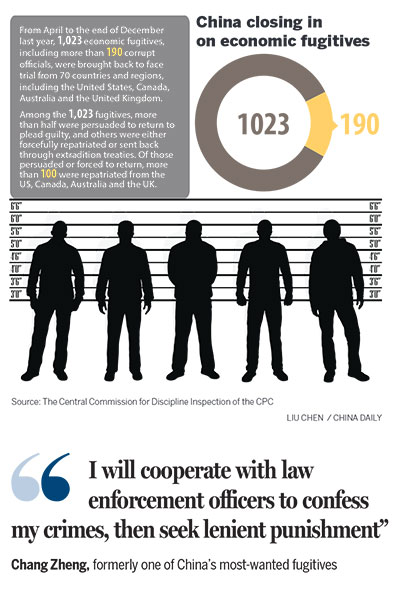Hunt for corrupt officials abroad is expected to be hot two sessions topic
China will stage its largest annual political and legislative events-the “two sessions”-starting on March 3. China Daily takes a close look at a series of likely hot topics and catchphrases during the sessions.
Skynet operation refers to the major special action involving Chinese judicial authorities, the Ministry of Foreign Affairs and the People’s Bank of China to target fugitives, especially corrupt officials still at large abroad, and to confiscate their ill-gotten proceeds. Under the operation, launched in April last year, Chinese law enforcement officers sought to nab a large number of fugitives, confiscate their illegal passports and other such documents, and smash underground banks. During the eight-month-long operation, they also seized a large amount of illegal assets and persuaded many suspects to return to confess to their crimes. The Skynet operation combines the actions of the Organization Department of the CPC Central Committee, the Ministry of Public Security, the Supreme People’s Procuratorate and the People’s Bank of China. It is intended to strengthen law enforcement cooperation with the countries involved, including the United States, Canada and Australia, and to boost measures to prevent fugitives from fleeing abroad to avoid prosecution and punishment.

ChangZheng, one of China’s most-wanted fugitives, told police his life on the run in Canada was marked by emotional hardship.
“While fleeing in Canada, I was so depressed that I couldn’t look after my elderly parents or contact my relatives, and I wanted every day to come back,” police quoted Zheng as saying after his return to China in mid-February.
“I will cooperate with law enforcement officers to confess my crimes, then seek lenient punishment,” he was quoted by police as saying.
The 47-year-old Chang, a former deputy manager of Shenzhen Oil Equipment Import and Export Co in Guangdong province, was persuaded to return to plead guilty to bribery charges after spending five years on the run in Canada.
He is the 24th fugitive brought back to face trial since Chinese judicial authorities launched a special operation code-named “Skynet” in April last year. The operation targeted 100 major officials suspected of corruption who are on the run and sought to confiscate their ill-gotten assets.
In recent years, the United States, Canada and Australia have become popular destinations for corrupt Chinese officials due to legal differences and the lack of extradition treaties, according to the Ministry of Public Security.
Hunting down fugitives is expected to be a hot topic among political advisers and lawmakers during the approaching annual sessions of the Chinese People’s Political Consultative Conference and the National People’s Congress, which will open on March 3 and 5, respectively.
Many delegates expect that Chinese law enforcement officers will make a breakthrough on nabbing fugitives-especially those corrupt officials who are still at large in Western countries such as the US, Canada, Australia and New Zealand-and repatriate them to stand trial.
Extradition treaties
“I hope that China will speed up negotiations with authorities in the US, Canada, Australia and New Zealand on signing bilateral extradition treaties and that they at least might agree on a time schedule,” said Du Mei, a CPPCC member and deputy director of the Television Artists Association in the Inner Mongolia autonomous region.
Xiong Jijun, an NPC deputy and vice-president of North University of China in Taiyuan, Shanxi province, said, “I am so worried that much more in public funds will be illegally sent abroad by corrupt officials, so judicial authorities should take strong measures to prevent such illegal transfers.”
Since April last year, the ministry has been working closely with the People’s Bank of China to monitor the suspicious flow of funds to suspects’ foreign accounts. It is also enhancing supervision of offshore companies and cracking down on underground banks to prevent suspected corrupt officials from sending assets abroad illegally.
